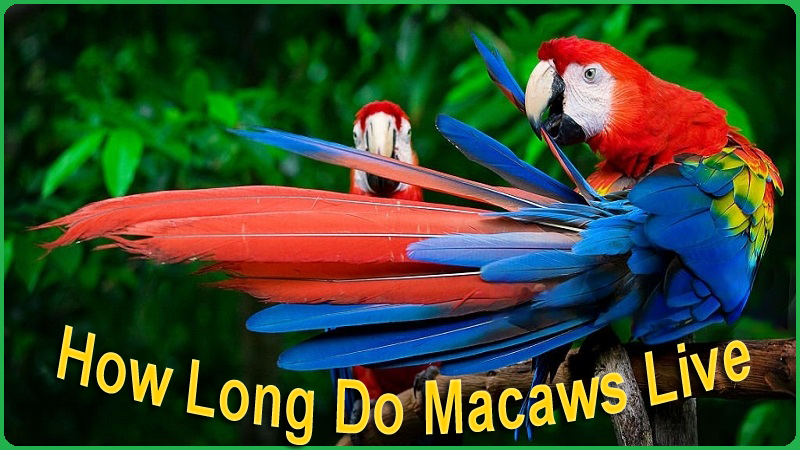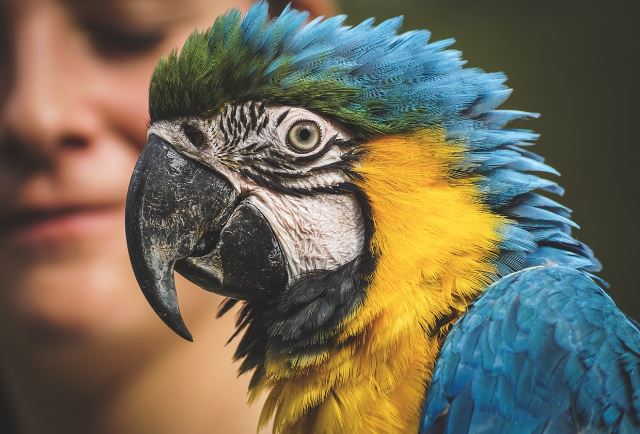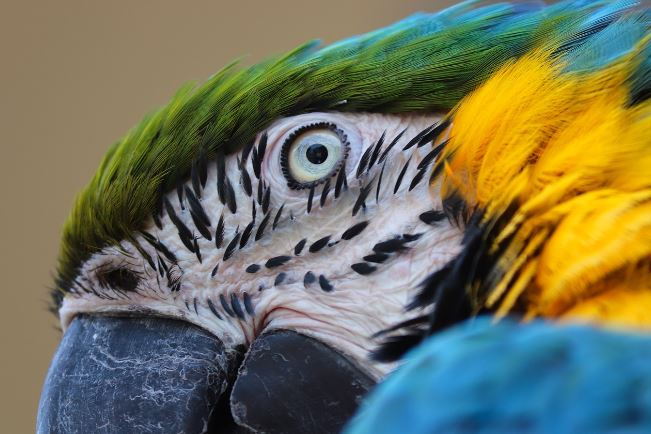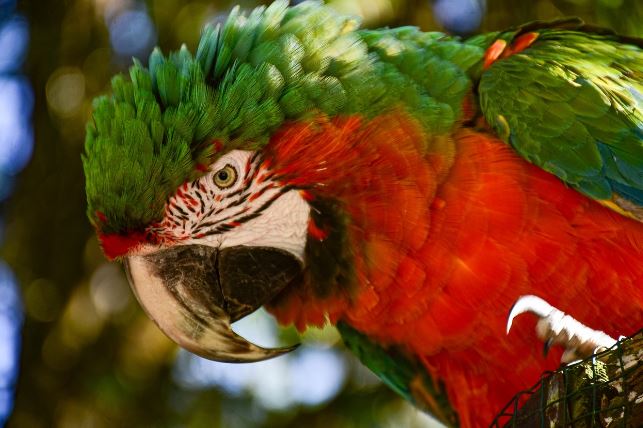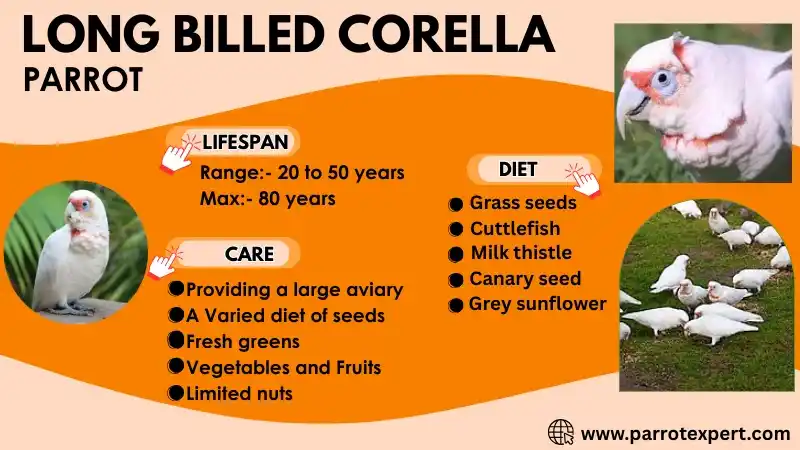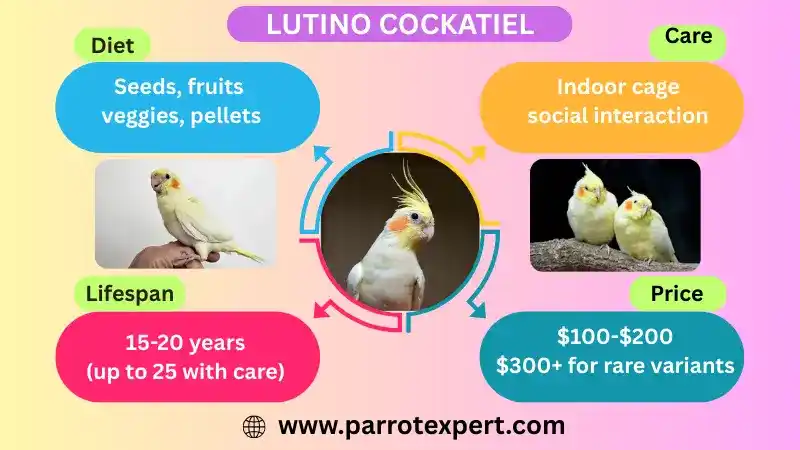The macaw is well-knowing parrot in the world to live longest. So, if you want to pet a macaw parrot; then you have to need lot of commitment. This is the main reason that macaw owners always want to get know about lifespan of macaw. The most common query is arising about, how long do macaws live?
So, what is macaw’s lifespan? As per our advisors, the average of macaw’s lifespan is between 40 and 50 years. However, it can differ and depend on their species. Some species are also available in the world that can live for over a century. You, if you take decision to buy a macaw into your home, then should be expecting a significant commitment.
Here, we will cover all reasons, why they generally get miracle lifespan; and will reveal all proactive methods to ensure that you can ensure your macaw reach their life expectancy.
Keep reading, this unique content, if you are serious about getting to pet one of these magnificent birds.
How Long Do Macaws Live in Wild?
In the wild, macaws do more struggles that can affect their longevity. They can affect many threats, predators, habitat destruction, diseases, and food scarcity. Despite of these adversities, many macaw species show more considerable lifespans.
Average Lifespan by Macaw’s Species
Blue-and-Yellow Macaw (Ara ararauna): This species is one of the most knowable in world. In the wild, they can live up to 30-35 years. However, reaching on this age is contingent on the availability of food, and the absence of severe environmental disruptions.
Scarlet Macaw (Ara macao): They are well-known for their striking red, yellow, and blue feathers. Scarlet Macaws typically live around 40-50 years in the wild. Their lifespan benefits can get from relative stability of their habitat that are parts of Central and South America.
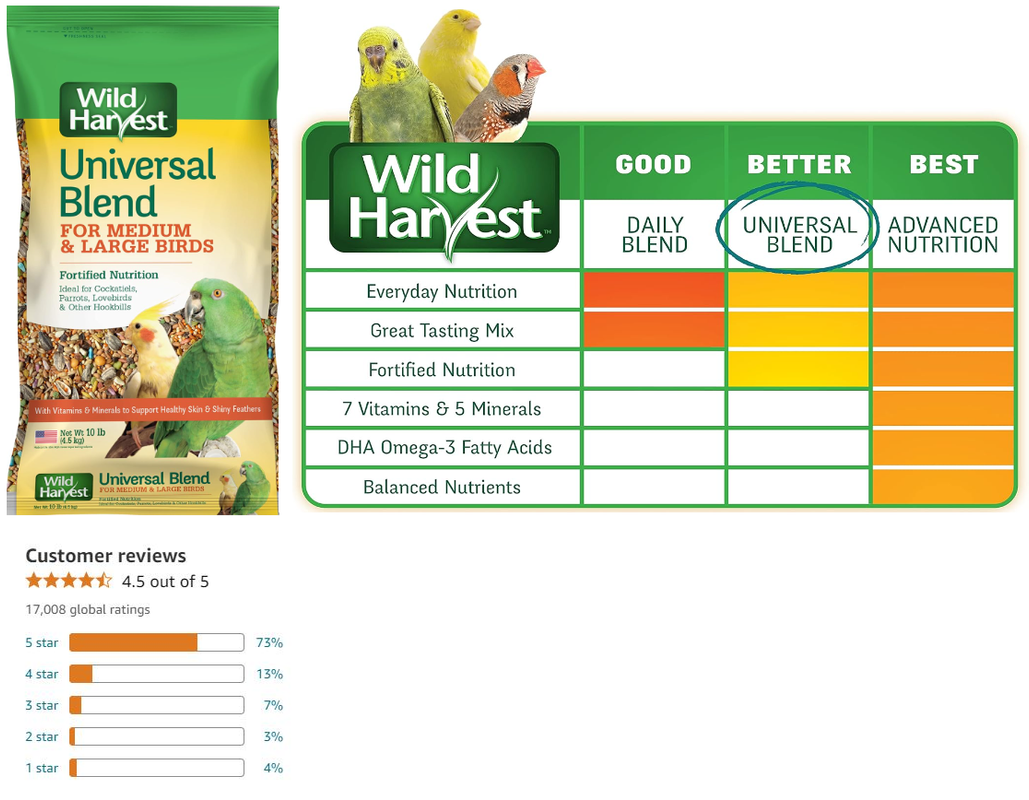
Green-Winged Macaw (Ara chloropterus): This is similar as Scarlet Macaw in size and habitat. The Green-Winged Macaw often reaches ages of 50 years or more in the wild. With assuming, they evade poachers and natural predators.
Hyacinth Macaw (Anodorhynchus hyacinthinus): The largest of all macaws, these birds are capable live up to 50 years in the wild. Their longevity may be affected with human activities, including logging and illegal pet trade.
How to Keep Your Parrot Healthy for a Long Life?
To keep your parrot healthy for a long life, follow these key guidelines:
Also Read: Quaker Parrot Colors Mutation: A Spectrum of Colors
Balanced Diet: Provide a mix of pellets, fresh fruits, vegetables, seeds, and nuts. But, you should avoid the harmful foods like chocolate and avocado.
Socialization: Interact with your parrot regularly to keep them mentally stimulated and emotionally healthy.
Stimulation and Exercise: Offer toys, puzzles, and playtime to encourage mental and physical activity.
Clean Environment: Maintain a clean cage, perches, toys, and food/water containers to prevent bacteria build-up.
Regular Check-Ups: Schedule annual vet visits for thorough check-ups, and early detection of health issues.
Avoid Toxins: Keep your parrot away from toxic substances like lead, zinc, and copper.
How Long Do Macaws Live in Captivity?
In captivity, macaws have significantly longer lifespan than they would in the wild, because they receive better nutrition, medical care, and protection from predators and environmental hazards.
Also Read: How Long Do African Grey Parrots Live? African Grey Lifespan
But, lifespan of macaws in captivity can vary by species, and their quality of care. Here, we will show you some potential lifespans of some macaw species in captivity.
Lifespan by Species in Captivity
Blue-and-Yellow Macaw (Ara ararauna)
- Average Lifespan: 50-60 years
- Potential Maximum: Up to 80 years
Blue-and-Yellow Macaws are among the most popular pet macaws. With proper care, they can get live long, healthy lives. Some factors may get affecting their longevity, such as balanced diets and regular veterinary check-ups.
Scarlet Macaw (Ara macao)
- Average Lifespan: 50-70 years
- Potential Maximum: Up to 80 years
They are known for their bright red feathers. Scarlet Macaws have ability to thrive in captivity when you offer a nutritious diet and enriched environment. Due to their social nature, they can get benefit greatly from interaction with their owners and other birds.
Green-Winged Macaw (Ara chloropterus)
- Average Lifespan: 60-70 years
- Potential Maximum: Up to 80 years
The Green-Winged Macaw likes as in appearance to the Scarlet Macaw but tends to be slightly larger. These birds can also enjoy a long lifespan in captivity, if their dietary and social needs are met consistently.
Hyacinth Macaw (Anodorhynchus hyacinthinus)
- Average Lifespan: 50-60 years
- Potential Maximum: Up to 80 years
Hyacinth is largest specie of macaw. So, hyacinth Macaws have to need significant space and specialized care with their dietary needs. They thrive on nuts, which provide the necessary fat content. With dedicated care, these majestic birds can also live very long lives.
Military Macaw (Ara militaris)
- Average Lifespan: 50-60 years
- Potential Maximum: Up to 70 years
Military Macaws is named for their predominantly green plumage resembling military uniforms. They are less common as pets but able to live long lives in captivity with proper care.
Factors Enhancing Longevity in Captivity
Diet and Nutrition
Balanced diet is most important for macaws’ health and longevity. In captivity, you can feed variety of fruits, vegetables, nuts, seeds, and specially formulated pellets. You should be avoiding foods toxic to macaws, like as chocolate, caffeine, and avocado.
Veterinary Care
You should give dedicated veterinary care is vital to identify and address health issues early. Routine health checks, vaccinations, and treatments for parasites contribute significantly to a macaw’s longevity.
Early detection of potential health problems, including feather plucking or respiratory issues, you can avoid more serious conditions from developing.
Mental and Physical Stimulation
Macaws are more intelligent and need mental stimulation to prevent boredom and associated behavioral issues. You have to offer a variety of toys, puzzles, and opportunities for social interaction that help keep them mentally engaged.
Physical exercise is also essential that allowing macaws to fly in safe. Providing climbing structures can help maintain their physical health.
Social Interaction
Macaws come in social birds, because they easily thrive on interaction, whether with their human caretakers or other birds.
If, they get more gaps in social interaction, then it can lead to behavioral problems and stress. Should provide regular positive interaction and socialization; they are crucial for their well-being.
What Are Stages of Macaw’s Life Cycle?
The life cycle of a macaw involves several stages, below shown each one:
Egg Stage
- Incubation Period: Typically lasts about 24 to 28 days.
- Parental Care: Both parents often share the responsibility of incubating the eggs. Although in some species, the female does most of the incubation while the male provides food.
Hatchling Stage
- Hatching: Macaw chicks, known as hatchlings, emerge from their eggs blind, naked, and entirely dependent on their parents.
- Feeding: Parents feed the hatchlings a regurgitated diet rich in nutrients. The feeding frequency is high, requiring constant attention from the parents.
- Growth and Development: Rapid growth occurs during this stage, with feathers beginning to develop after a few weeks.
Nestling Stage
- Feather Development: By about 4 to 6 weeks, nestlings start developing their first set of feathers, known as pin feathers.
- Increased Activity: As their feathers grow, nestlings become more active and start to explore their nest environment.
- Parental Feeding: Parents continue to feed the nestlings until they are ready to fledge.
Fledgling Stage
- Learning to Fly: Around 10 to 12 weeks, fledglings begin to test their wings and learn to fly. This stage is crucial for developing flight skills.
- Parental Guidance: Parents guide fledglings, teaching them how to find food and avoid predators.
- Gradual Independence: Fledglings gradually become more independent, but may still rely on their parents for food and protection.
Juvenile Stage
- Developing Skills: Juvenile macaws continue to develop their physical and social skills. This stage can last from a few months to several years, depending on the species.
- Socialization: Young macaws learn to interact with other members of their flock, establishing social hierarchies and bonds.
- Exploration: Juveniles explore their environment more extensively, honing their survival skills.
Adulthood
- Sexual Maturity: Macaws reach sexual maturity between 3 and 6 years of age, depending on the species.
- Breeding: Adult macaws find mates and establish breeding pairs.
- Nesting: Adults select nesting sites, typically in tree cavities, where they will raise their offspring.
- Reproductive Cycle: The reproductive cycle begins anew with the laying of eggs and the continuation of the species.
Senior Stage
- Longevity: In captivity, macaws can live significantly longer than in the wild. They often reach 50-80 years, depending on the species and care conditions.
- Health Care: Older macaws may require special care to address age-related health issues, such as arthritis or reduced vision.
- Quality of Life: For senior macaws, you should offer high quality of life through mental stimulation, a balanced diet, and regular veterinary care.
How Long Can Macaws Live Without Food?
Macaws also have high metabolic rates like as most birds. That means; they require a consistent intake of food to keep maintain their energy levels.
General Time Frame to Survive Without Food
- Healthy Adult Macaws: Generally, a healthy adult macaw might survive without food for about 48 to 72 hours. After this period, the bird’s health will begin to deteriorate rapidly.
- Young or Sick Macaws: Young macaws (especially chicks and fledglings) and sick macaws have underlying health issues. They have much lower tolerance for food deprivation and may start to suffer severe effects within 24 to 48 hours.
Effects of Starvation
First 24 Hours: The bird may show signs of lethargy, decreased activity, and possibly irritability.
24-48 Hours: The macaw will begin to show more pronounced signs of weakness, reduced body temperature, and potentially labored breathing.
Beyond 48 Hours: You will see severe health complications such as muscle atrophy, organ failure, and potentially death, if food intake is not resumed.
Why Do Macaws Live So Long?
Macaws are also well-known for their impressive lifespans. They can extend up to 50-80 years in captivity. There are several factors contribute to their longevity:
Also Read: Do Cockatiels Have Ears? Their Unique Hearing
Reduced Oxidative Damage: Macaws have lower levels of oxidative damage as compared to mammals. Due to reduced oxidative, birds have been produces stunning mechanisms that helps to protect themselves from rapid aging. So it also helps to expand their longer lifespan.
Flying Ability: Flying nature allows birds to escape predation. Some data shows that both birds and mammals that can fly tend to have increased lifespans. As per advisors, exertional exercise, such as flying helps to contribute longer lifespans in animals.
Lower Oxidative Damage in Mitochondrial DNA: Despite the increased energy required for flight, birds, particularly parrots like macaws, have lower levels of oxidative damage in their mitochondrial DNA. This reduced oxidative damage helps prevent cellular aging and dysfunction, contributing to their extended lifespan.
Complex Mechanisms to Reduce Damage: Birds possess a complex array of mechanisms to reduce damage from oxidative processes. So, these mechanisms help to plasticity in the hypothalamo-pituitary-gonadal axis, and regrowth of neurons in the central nervous system.
FAQs (Frequently Asked Questions)
What is The Maximum Age of Macaw as Pets?
There is no any definitive maximum age for macaws in captivity, but individuals have been known to live over 80 years with proper care. The average lifespan of a macaw in captivity can vary by species, but generally ranges from 50 to 70 years.
Do Different Species of Macaws Have Different Lifespans as Pets?
Yes! Different species of macaws have varying lifespans as pets. For example, Blue-and-Yellow Macaws can live around 50-60 years, while Hyacinth Macaws can live up to 80 years or more with proper care.
How Can I Tell if My Pet Macaw is Aging Gracefully?
There are some signs of graceful aging in macaws, include maintaining a healthy weight, active engagement in activities, and normal feather condition.
Final Notes
If you are capable to take care of them well, then macaws can make best companion birds. Now, we hope that you have to read this article be carefully about ‘How Long Do Macaws Live’ and ‘Macaws Lifespan in Wild & Captivity’. Thus, you have been obtained all answers your all queries regarding macaws lifespan as pets and wild region.
Also Read: Scarlet Macaw Lifespan: Facts & Care Tips for Longevity
If this content is helpful for you, then please share it along with your friends, family members, pet lovers or relatives over social media platforms like as Facebook, Instagram, Linked In, Twitter, and more.
Do you have any experience, tips, tricks, or query regarding on this? You can drop a comment!
Have a Nice Day!!

